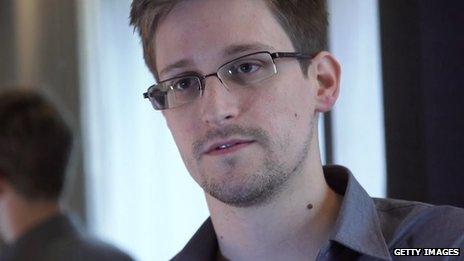Edward Snowden leaks damaging, says Nick Clegg
- Published

The Guardian has promised yet more leaks from the former US security contractor Edward Snowden
The publication of sensitive information about UK intelligence programmes has been damaging, Deputy Prime Minister Nick Clegg has said.
Mr Clegg said stories in the Guardian about GCHQ "would have been of immense interest to people who want harm".
There was however a legitimate debate to be had about the use of mass surveillance programmes, he added.
His comments came after the Guardian vowed to publish more leaks from US ex-intelligence worker Edward Snowden.
Speaking on his weekly LBC radio phone-in, Mr Clegg said he had "no doubt" that some of the information published by the newspaper "would have been of immense interest to people who want harm".
'Legitimate debate'
But he added that the development by the agencies of powerful new communications surveillance techniques raised wider issues of concern.
He said: "I think there is a totally legitimate debate to be had - and my experience speaking to people in the intelligence agencies is they recognise this - about the use of these new, incredibly powerful technologies.
"We have regulations that were designed for an age which is quite different now.
"Both terrorists and states and security agencies now conduct this battle online in a way that was unimaginable just a few years ago.
"What that means for privacy and proportionality, that is a totally legitimate area of debate. How you hold the secret parts of any state to account is an incredibly important issue.
Mr Clegg backed the security services' calls for a measure of secrecy, which he said was necessary to keep Britain safe.
'Gift to terrorists'
But, he said, "you can only really make secrecy legitimate in the eyes of the public if there is proper form of accountability".
His comments came after the director general of MI5, Andrew Parker, warned in a speech that the disclosure of the "reach and limits" of GCHQ's capabilities was a "gift" to terrorists.
Mr Parker dismissed suggestions that the agencies were trawling through people's private lives for anything that looked interesting as "utter nonsense".
Responding to Mr Parker's criticism, the Guardian editor Alan Rusbridger insisted his newspaper was right to publish the information leaked by US security contractor Edward Snowden.
And he said that more would follow as the leaked documents were "slowly and responsibly" worked through.
Speaking on a visit to York, Prime Minister David Cameron said that when newspapers get hold of a vast amount of information that has been "effectively stolen", they have to "think about their responsibilities and are they helping to keep our country safe".
He continued: "To be fair to the Guardian, when I sent the Cabinet Secretary [Sir Jeremy Heywood] to tell them about how dangerous it was to hold this information, they agreed to have a whole lot of it destroyed.
"They have understood it on some occasions but they need to show understanding about this issue because it does go to our ability to fight terrorism."
Meanwhile, Mr Snowden's father Lon arrived in Russia on Thursday to visit his son.
Edward Snowden was granted asylum in Russia in August after weeks spent in a transit zone at Moscow airport when the US revoked his travel documents.
Lon Snowden said he felt "extreme gratitude that my son is safe and secure and he's free".
In the US, Edward Snowden faces charges of theft of government property, unauthorised communication of national defence information and wilful communication of classified intelligence.
- Published9 October 2013
- Published9 October 2013
- Published10 October 2013